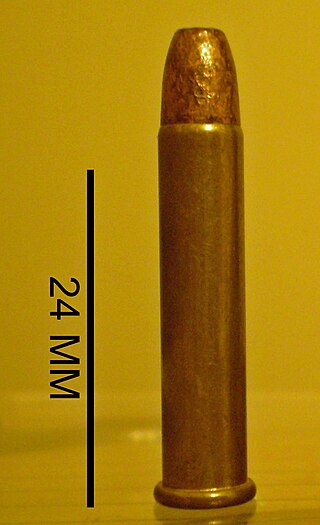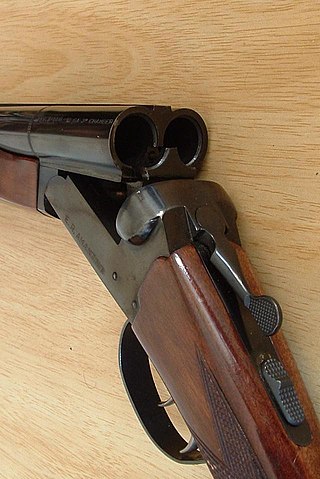A shotgun is a long-barreled firearm designed to shoot a straight-walled cartridge known as a shotshell, which discharges numerous small spherical projectiles called shot, or a single solid projectile called a slug. Shotguns are most commonly used as smoothbore firearms, meaning that their gun barrels have no rifling on the inner wall, but rifled barrels for shooting sabot slugs are also available.

The .410 bore (10.4 mm) is one of the smallest caliber of shotgun shell commonly available. A .410 bore shotgun loaded with shot shells is well suited for small game hunting and pest control. The .410 started off in the United Kingdom as a garden gun along with the .360 and the No. 3 bore (9 mm) rimfire, No. 2 bore (7 mm) rimfire, and No. 1 bore (6 mm) rimfire. .410 shells have similar base dimensions to the .45 Colt cartridge, allowing many single-shot firearms, as well as derringers and revolvers chambered in that caliber, to fire .410 shot shells without any modifications.

The .22 Hornet or 5.6×36mmR Hornet is a varminting, small-game hunting, survival and competition centerfire rifle cartridge commercially introduced in 1930. It is considerably more powerful than the rimfire .22 WMR and the .17 HMR, achieving higher velocity with a bullet twice the weight of the .17 HMR bullet. The Hornet also differs significantly from these in that being a centerfire cartridge makes it reloadable, and thus more versatile. It was the smallest commercially available .22 caliber centerfire cartridge until the introduction of the FN 5.7×28mm.

The .22 Winchester Magnum Rimfire, also known as the .22 WMR, .22 Magnum, .22 WMRF, .22 MRF, or .22 Mag, is a rimfire cartridge. Originally loaded with a bullet weight of 40 grains (2.6 g) delivering velocities in the 2,000 feet per second (610 m/s) range from a rifle barrel, .22 WMR is now loaded with bullet weights ranging from 50 grains (3.2 g) at 1,530 feet per second (470 m/s) to 30 grains (1.9 g) at 2,200 feet per second (670 m/s).

Harrington & Richardson Arms Company is an American brand of firearms and a subsidiary of JJE Capital Holdings. H&R ceased independent production February 27, 2015.

The ArmaLite AR-7 Explorer is a semi-automatic firearm in .22 Long Rifle caliber, developed in 1959 from the AR-5 that was adopted by the U.S. Air Force as a pilot and aircrew survival weapon. The AR-7 was adopted and modified by the Israeli Air Force as an aircrew survival weapon in the 1980s.
The ArmaLite AR-5 is a lightweight bolt-action takedown rifle chambered for the .22 Hornet cartridge and adopted as the MA-1 aircrew survival rifle by the United States Air Force. It was developed by ArmaLite, a division of Fairchild Engine and Airplane Corporation in 1954.

A combination gun is a firearm that usually comprises at least one rifled barrel and one smoothbore barrel, that is typically used with shot or some type of shotgun slug. Most have been break-action guns, although there have been other designs as well. Combination guns using one rifled and one smoothbore barrel are commonly found in an over-and-under configuration, while the side-by-side configuration is usually referred to as a cape gun. A combination gun with more than two barrels is called a drilling with three barrels, a vierling with four barrels, and a fünfling with five barrels. Combination guns generally use rimmed cartridges, as rimless cartridges are usually more difficult to extract from a break-action firearm.

Break action is a type of firearm action in which the barrel(s) are hinged much like a door and rotate perpendicularly to the bore axis to expose the breech and allow loading and unloading of cartridges. A separate operation may be required for the cocking of a hammer to fire the new round. There are many types of break-action firearms; break actions are universal in double-barreled shotguns, double-barreled rifles, combination guns, and are commonly found in single shot pistols, rifles, shotguns, including flare guns, grenade launchers, air guns, and some older revolver designs. They are also known as hinge-action, break-open, break-barrel, break-top, or, on old revolvers, top-break actions.

The Springfield Armory M6 Scout is a .22 Hornet over .410 bore combination gun that is virtually identical to the original M6 Aircrew Survival Weapon. It is also made in .22 Long Rifle over .410 bore and .22 Magnum over .410 bore. The Scouts are made with 18.25 inches (46.4 cm) barrels, as opposed to the original M6's 14 inches (36 cm) barrel length, to comply with National Firearms Act. The later models have large over-sized trigger guards and Picatinny rails for mounting a wide range of sights and scopes. They come in stainless steel or with a Parkerized finish.

The TP-82 is an out-of-service triple-barreled Soviet combination gun carried by cosmonauts on space missions. It was intended as a survival aid to be used after landings and before recovery in the Siberian wilderness.

The M30 Luftwaffe Drilling ("triple") was a survival weapon issued to Luftwaffe pilots during World War II. It was used by airmen operating in Northern Africa. The M30 was intended to be used for hunting and self-defense against a variety of natural predators.

The M4 Survival Rifle was a .22 caliber bolt-action rifle developed after World War II as part of the survival gear stored under the seat of American military aircraft. It was designed to give downed aircrew a survival weapon for foraging wild game for food.
Chiappa Firearms, Armi Sport di Chiappa, is an Italian firearms manufacturing company based in Brescia. It was founded in 1958 by Ezechiele Chiappa as Armi Sport. Total unit production is around 60,000 per year. Its U.S. headquarters are in Dayton, Ohio.

The Savage Model 24 is an American made over-and-under combination gun manufactured by Savage Arms. The basic .22LR over .410 gauge model weighs 7 pounds, has 24-inch barrels and has an overall length of 41-inches. It may also be disassembled for ease of storage.

Garden guns are small bore shotguns commonly used by gardeners and farmers for pest control. They are made to fire small gauges such as .410 bore, .360 bore, 9mm Flobert, and .22 Winchester Magnum Rimfire, or .22 Long Rifle rimfire shotshell cartridges. They are short-range shotguns that can do little harm past 15 to 20 yd, and they are relatively quiet when fired with rimfire ammunition. These guns are especially suitable for use inside barns and sheds, as the low-velocity small shot will not penetrate roofs or walls, or injure livestock with a ricochet. Such guns are also used for pest control at airports, warehouses, stockyards, etc.
The Chiappa Little Badger is a family of Italian-made survival rifles and shotguns manufactured by Chiappa Firearms. The three basic models are chambered for .22LR, .22 WMR, .17WSM, .17HMR, and 9mm Flobert.
The Chiappa M6 Survival Gun is an over and under combination gun that comes in four versions; 12 gauge over .22 LR, 12 gauge over .22 WMR, 20 gauge over .22 LR, and 20 gauge over .22 WMR. It has a similar appearance to the original M6 Aircrew Survival Weapon, with a skeletonized metal buttstock surrounding a polypropylene foam insert. It uses double triggers and an enclosed firing mechanism.
The Chiappa Double Badger is an Italian made over and under combination gun manufactured by Chiappa Firearms. It comes in four versions: .22 LR over .410 bore, .22 WMR over .410 bore, .22 LR over 20 gauge, and .243 Winchester over .410 bore. It's marketed as "a great choice for hunting, survival, or fun recreational shooting".

The Chiappa Triple Crown is a family of Italian-made triple-barrel, break-action shotguns, chambered in 12-gauge, 20-gauge, 28-gauge, and .410 bore. The barrels have a triangular arrangement with one on top and two below. This gives the Triple Crown a single-barrel sight picture.















